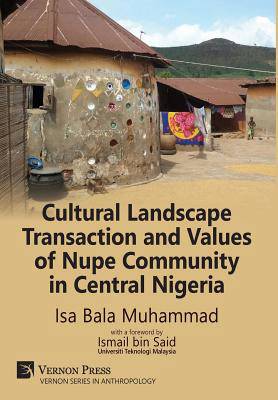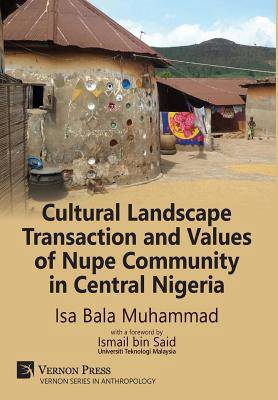
- Afhalen na 1 uur in een winkel met voorraad
- Gratis thuislevering in België vanaf € 30
- Ruim aanbod met 7 miljoen producten
- Afhalen na 1 uur in een winkel met voorraad
- Gratis thuislevering in België vanaf € 30
- Ruim aanbod met 7 miljoen producten
Cultural Landscape Transaction and Values of Nupe Community in Central Nigeria
Isa Bala MuhammadOmschrijving
The book provides readers with insights on how cultural landscapes are conceptualised under two major realms of tangible and intangible values as exemplified in this study of a rural Nupe community in central Nigeria. Equally important are the people-space and place relationship which results in a sense of place. The cultural values of communities are a product of both natural as well as the social setting which begins with the family. Accordingly, this book showcases how the concept of family structure shapes the architecture of the domestic space. Similarly, it also exemplifies how tangible and intangible cultural values are constituted within the domestic space as well as the entire cultural landscape.
The uniqueness of this book is on the empirical evidence which is based on the documentation of an eight-month ethnographic study which brought about the native's resident perception of their cultural landscape. This aligns with the global call in which UNESCO is at the forefront advocating the need for the preservation of values and identities of cultural landscapes. More also is that scholars in Human geography, Anthropology, Ethnography, Architecture and Cultural landscape studies can relate to the cultural transactions discussed in different chapters this book. The concluding chapter of this book gives the deductions drawn from the cultural landscape values of Nupe community which resulted in the formulation of Grounded Theory with spatial implications.
Specificaties
Betrokkenen
- Auteur(s):
- Uitgeverij:
Inhoud
- Aantal bladzijden:
- 122
- Taal:
- Engels
- Reeks:
Eigenschappen
- Productcode (EAN):
- 9781622732302
- Verschijningsdatum:
- 28/07/2017
- Uitvoering:
- Hardcover
- Formaat:
- Genaaid
- Afmetingen:
- 152 mm x 229 mm
- Gewicht:
- 322 g

Alleen bij Standaard Boekhandel
Beoordelingen
We publiceren alleen reviews die voldoen aan de voorwaarden voor reviews. Bekijk onze voorwaarden voor reviews.











